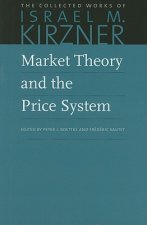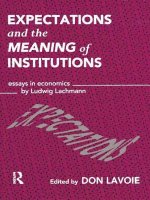
Kód: 04542192
Institutional Foundations of Impersonal Exchange
Autor Benito Arrunada
Governments and development agencies devote considerable resources to building institutions to protect property rights. When the owners of property feel that their claims are protected by law, they have greater incentive to invest ... celý popis
- Jazyk:
 Angličtina
Angličtina - Vazba: Pevná
- Počet stran: 320
Nakladatelství: The University of Chicago Press, 2012
- Více informací o knize

2119 Kč
Dostupnost:
50 % šance Máme informaci, že by titul mohl být dostupný. Na základě vaší objednávky se ho pokusíme do 6 týdnů zajistit.
Máme informaci, že by titul mohl být dostupný. Na základě vaší objednávky se ho pokusíme do 6 týdnů zajistit.Prohledáme celý svět
Mohlo by se vám také líbit
Dárkový poukaz: Radost zaručena
- Darujte poukaz v libovolné hodnotě a my se postaráme o zbytek.
- Poukaz se vztahuje na celou naši nabídku.
- Elektronický poukaz vytisknete z e-mailu a můžete ihned darovat.
- Platnost poukazu je 12 měsíců od data vystavení.
Informovat o naskladnění knihy
Zadejte do formuláře e-mailovou adresu a jakmile knihu naskladníme, zašleme vám o tom zprávu. Pohlídáme vše za vás.
Více informací o knize Institutional Foundations of Impersonal Exchange
Nákupem získáte 212 bodů
 Anotace knihy
Anotace knihy
Governments and development agencies devote considerable resources to building institutions to protect property rights. When the owners of property feel that their claims are protected by law, they have greater incentive to invest in their property or use it as collateral. Similarly, when entrepreneurs are able to easily formalize their activities, they benefit from gaining access to courts and transforming their firms into legal entities. Policies for protecting property rights have thus become an important factor in economic growth. Benito Arrunada broadens this account through an examination of the costs and benefits of strong property rights within the context of impersonal trade. Trading with strangers is a route to growth, but inherent in the process are risks that can be mitigated by land and company registries, which enable both sides to protect their property rights. Tracing the development of registries in developed and developing countries, Arrunada argues that, while no single institutional arrangement is appropriate across the board, there are general principles that may be applied to facilitate the protection of both private property and impersonal trade. With its nuanced presentation of the theoretical and practical implications, this book expands our understanding of how property rights work in today's world.
 Parametry knihy
Parametry knihy
Zařazení knihy Knihy v angličtině Economics, finance, business & management Economics Economic theory & philosophy
2119 Kč
- Plný název: Institutional Foundations of Impersonal Exchange
- Podnázev: Theory and Policy of Contractual Registries
- Autor: Benito Arrunada
- Jazyk:
 Angličtina
Angličtina - Vazba: Pevná
- Počet stran: 320
- EAN: 9780226028323
- ISBN: 0226028321
- ID: 04542192
- Nakladatelství: The University of Chicago Press
- Hmotnost: 574 g
- Rozměry: 241 × 170 × 3 mm
- Datum vydání: 24. August 2012
Oblíbené z jiného soudku
-

Wealth of Nations
146 Kč -

Why Women Have Better Sex Under Socialism
306 Kč -

Capitalism: A Very Short Introduction
249 Kč -

Wealth of Nations
330 Kč -

Inquiry into the Nature and Causes of the Wealth of Nations
276 Kč -

Inquiry into the Nature and Causes of the Wealth of Nations
744 Kč -

Seventeen Contradictions and the End of Capitalism
265 Kč -

Principles of Economics
594 Kč -

General Theory of Employment, Interest and Money
529 Kč -

Market Theory & the Price System
563 Kč -

Basic Economics
840 Kč -

Essential Keynes
357 Kč -

Doughnut Economics
338 Kč -

Book of Satoshi
492 Kč -

Worldly Philosophers
303 Kč -

Human Action (4-Volume Set)
939 Kč -

New Economics for Industry, Government, Education
1022 Kč -

Naked Economics
381 Kč -

General Theory of Employment, Interest and Money
397 Kč -

Keynes Hayek
415 Kč -

Origin Of Wealth
303 Kč -

Oxford Handbook of Law and Economics
1551 Kč -

Pure Theory of Capital
355 Kč -

Keynes
303 Kč -

OPEC and the Price of Petroleum
1681 Kč -

Contra Keynes & Cambridge
420 Kč -

Bourgeois Virtues
1041 Kč -

Economics Book
615 Kč -

Book of Satoshi
817 Kč -

Expectations and the Meaning of Institutions
2123 Kč -

Reflections on Ethics, Freedom, Welfare Economics, Policy, and the Legacy of Austrian Economics
563 Kč -

Essence of Entrepreneurship and the Nature and Significance of Market Process
542 Kč -

Cultural Considerations within Austrian Economics
679 Kč -

Legalized Crime of Banking
597 Kč -

Fortunes of Liberalism
361 Kč -

Epistemological Problems of Economics
341 Kč -

Keynesian Episode
355 Kč -

Four
234 Kč -

Economics of Good and Evil
675 Kč -

Happiness
303 Kč -

Wealth of Nations
320 Kč -

Constitution of Liberty
701 Kč -

Economics for the Common Good
443 Kč -

Wealth of Nations
611 Kč -

Mathematics for Economics and Finance
1434 Kč -

What the Dog Saw
234 Kč -

Technological Revolutions and Financial Capital
1025 Kč -

Kicking Away the Ladder
587 Kč -

Thomas Piketty's 'Capital in the Twenty-First Century'
633 Kč
Osobní odběr Praha, Brno a 12903 dalších
Copyright ©2008-24 nejlevnejsi-knihy.cz Všechna práva vyhrazenaSoukromíCookies






 Vrácení do měsíce
Vrácení do měsíce 571 999 099 (8-15.30h)
571 999 099 (8-15.30h)